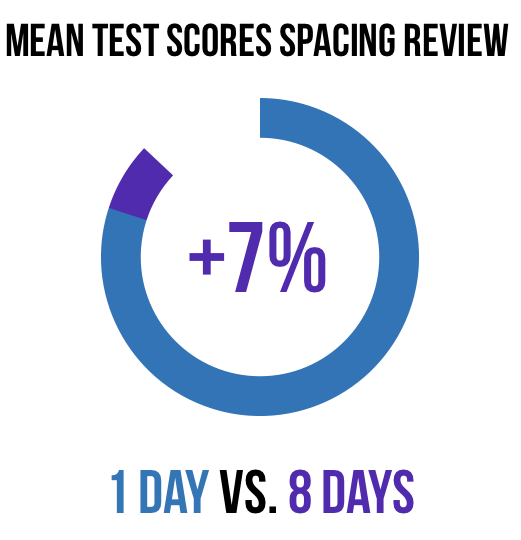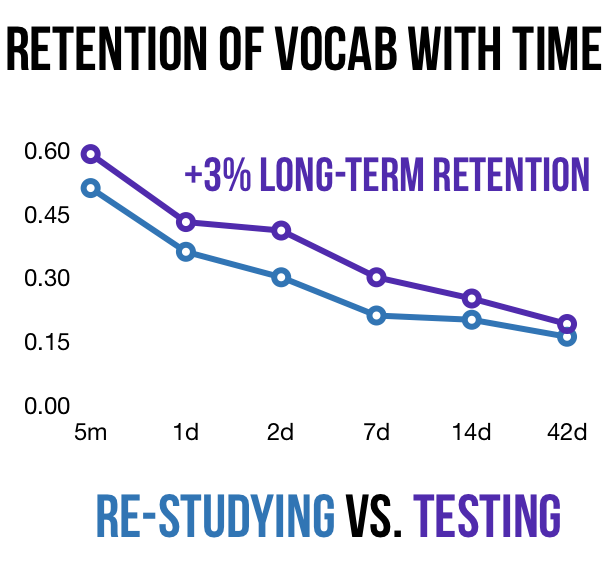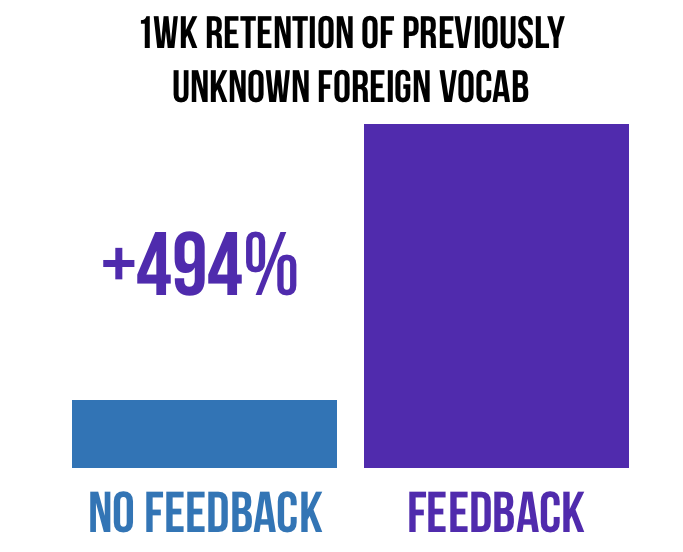Research
Our review assignments enable students to better retain what they learn. Imperative to this goal, we have designed the format of these reviews to incorporate fundamental principles of cognitive neuroscience:
- Distributed Practice ("Spacing Effect")
Cognitive neuroscience says...
Dispersing study more frequently over a longer time period results in drastically more effective learning than concentrated intense study. Research indicates that practice broken up into several short sessions results in improved memory consolidation and retention. In a simulated university lecture, simply adjusting the timing of a single online review increased performance by one half-letter grade (7-percent absolute performance improvement) on a final test 35 days later. (Kapler et al., 2015)
Our implementation follows...
Assignments are kept short and sweet –– the typical assignment should not take longer than 20-minutes for a student to complete. Additionally, assignments are generated for students several days after the educator teaches about a topic. As a result, students will be consistently reviewing material throughout the length of a course. Ultimately, students will spend less time mastering more information.
This structure of short, consistent review assignments also presents inherent opportunities for students to revisit previously learned topics at optimized intervals, reinforcing knowledge over time.

- Generation Effect ("Retrieval Practice")
Cognitive neuroscience says...
Information is better remembered if it is generated or retrieved from one’s own mind rather than simply read. Studies find self-generation to be a highly effective strategy for learning and remembering educational material. (Jacoby, 1978) Research shows that "facts reviewed through testing are retained significantly better than facts reviewed through re‐studying" alone. (Carpenter et al., 2009)
One study found the retention of English-Swahili word pairs to be better at every tested interval between five minutes and 42 days for the group that studied via re-testing (i.e., being asked the corresponding vocabulary term for one-half of the word pair) opposed to the group that studied via re-studying (i.e., seeing the word pairs at once). (Carpenter et al., 2008)
Our implementation follows...
Topics are introduced into assignments via a free response question that requires the learner to try to retrieve this bit of information from their own mind. For instance, in a linguistics class, before showing presentations, lecture clips, or discussions about Piaget's theory of cognitive development, a student may be asked to write briefly about their current knowledge of the topic.

- Feedback Loops
Cognitive neuroscience says...
Metacognition of one’s own learning abilities and current understanding of material vastly increases educational success. Self-assessment and a critical awareness of one’s own performance through constant feedback augments the learning process. Studies found that having students complete a retrieval exercise (short answer question, etc.), providing immediate corrective feedback, and then having the student demonstrate familiarity with that feedback lead to dramatically increased retention and testing performance. (Carpenter et al., 2009) (Bransford et al., 2000)
One study found a 494% better one-week retention rate of English-Luganda word pairs for the group that received feedback during the study session opposed to the group that only received a correct or incorrect indication. (Pashler et al., 2005)
Our implementation follows...
Immediately after submitting a response to a retrieval question, students receive instant feedback in several forms: the educator's solution to the question, crowd- and machine-learning-identified best study materials, and a corrective multiple choice question to ensure the student's comprehension. The corrective multiple choice questions include explanations for each correct and incorrect solution as additional feedback to help the student understand the topic.

In addition to leveraging these known principles of cognitive neuroscience, we continue to study the best machine learning methods to identify unique learning styles and individual knowledge gaps, allowing us to cater the right content to the right students at the right time. Learning styles are more complex than just auditory or visual, and require advanced techniques to identify the different abstractions that exist.
In all, we utilize a modern understanding of the neural correlates of learning and retention to form the architecture of our review assignments. Employed in conjunction with tried and tested machine learning techniques, optimizing content selection and delivery, we are ultimately able to improve student performance.
From a university? Get in touch to add OpenClass to your curriculum!
References
Bransford, J. D., Brown, A. L., & Cocking, R. R. (Eds.). (2000). How people learn: Brain, mind, experience, and school (Expanded edition). Washington, DC: The National Academies Press.
Carpenter, S. K., Pashler, H., Wixted, J. T., & Vul, E. (2008). The effects of testing on learning and forgetting. Memory & Cognition, 36, 438e448. https://dx.doi.org/10.3758/MC.36.2.438.
Carpenter, S. K., Pashler, H., & Cepeda, N. J. (2009). Using tests to enhance 8th grade students’ retention of U.S. history facts. Applied Cognitive Psychology, 23, 760–771. https://doi.org/10.1002/acp.1507.
Jacoby, L. L. (1978). On interpreting the effects of repetition: Solving a problem versus remembering a solution. Journal of Verbal Learning and Verbal Behavior, 17, 649-667. https://doi.org/10.1016/S0022-5371(78)90393-6.
Kapler, I. V., Weston, T., & Wiseheart, M. (2015). Spacing in a simulated undergraduate classroom: Long-term benefits for factual and higher-level learning. Learning and Instruction, 36, 38-45. https://dx.doi.org/10.1016/j.learninstruc.2014.11.001.
Pashler, H., Cepeda, N. J., Wixted, J. T., & Rohrer, D. (2005). When does feedback facilitate learning of words? Journal of Experimental Psychology Learning Memory and Cognition, 31, 3e8. https://dx.doi.org/10.1037/0278-7393.31.1.3.
